In Photos: KAICID in the Central African Republic
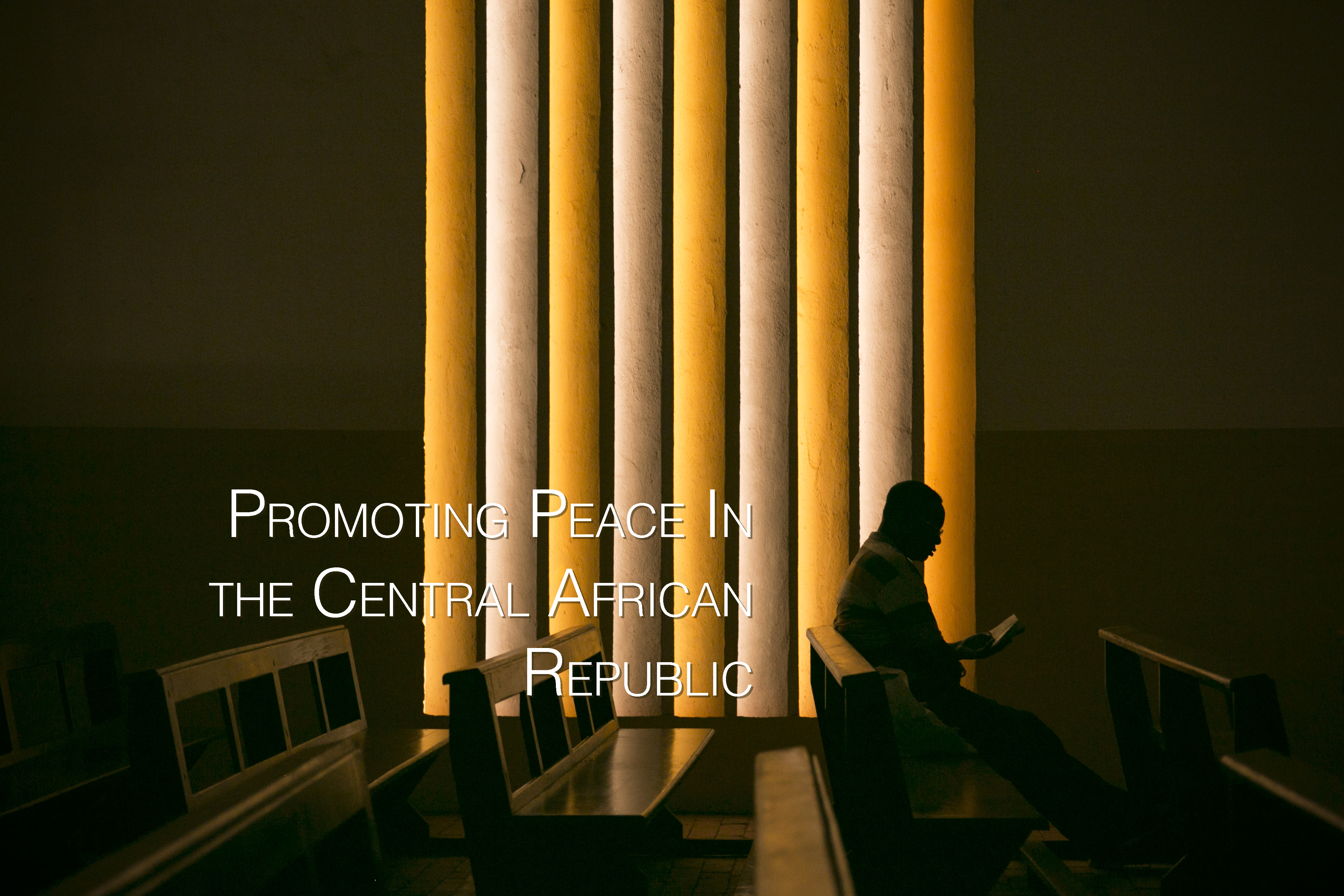
The International Dialogue Centre (KAICIID) has been working in the Central African Republic (CAR) since 2014. In early 2015, representatives from the country’s Christian and Muslim communities adopted the Vienna Action Plan through which religious leaders committed to include and respond to the needs of youth and women, advocate for policies to recognise Muslims as equal citizens and establish programmes to support dialogue between Christians and Muslims.
Since then, KAICIID has engaged members of CAR’s religious communities through awareness-raising activities, developed a dialogue training module, trained women, youth and community and religious leaders in dialogue, and supported community-healing initiatives. As a KAICIID Focus Region, the Centre is commited to establishing operational and sustainable mechanisms to strengthen the capacity of religious leaders to prevent violence and engage in interreligious dialogue for reconciliation in the Central African Republic.
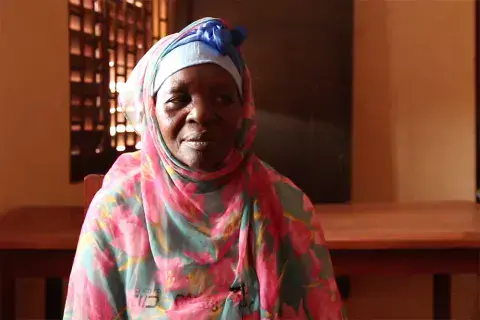
Awa Ngaina, is a Muslim resident of Bangui who fled her home in the 8th district due to violence. Photo: Kaleb Warnock/KAICIID
“The teeth and the tongue sometimes tear apart, but they are called to live together. Today, we went back home to live together.”
Awa recently returned with the help of Christians from Bangui who work alongside Muslims with the help of the local NGO, CARP8. KAICIID supports local organizations like CARP8 that are building community cohesion by offering technical support, micro grants and training in conflict transformation and interreligious dialogue.
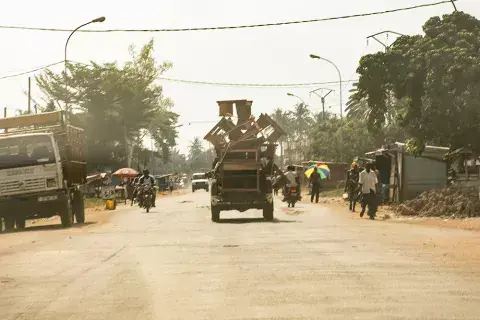
An overloaded truck hauls furniture down a central street in Bangui. Photo: Kaleb Warnock/KAICIID
The people of CAR suffered from a surge of violence after militias took power in March 2013 and excised their revenge on the population. In late 2016 conflict broke out anew following the elections, this time between ex-Seleka and anti-balaka militias. Currently there are nearly 1.3 million forcefully displaced Central Africans – more than 569.8 thousand in neighbouring countries and 693.9 thousand internally, placing a massive burden on the country, which is in currently the least-developed country in the world, according to the UNDP’s Human Development Index.
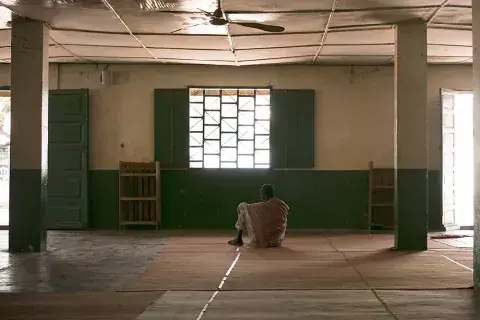
A man sits alone, enveloped in the stillness of the Central Mosque located in PK5. Photo: Kaleb Warnock/KAICIID
PK5, which stands for post kilometre five, is a predominantly Muslim neighbourhood that was the last refuge for Muslims in Bangui following the eruption of violence in 2013. At the time, Muslims did not leave the district because of the risk of attack, and those who had lives and work outside of the district lost everything. KAICIID is bringing together leaders within the Muslim community to overcome intra-community conflict and to engage and dialogue with the Christians of CAR with a united voice.
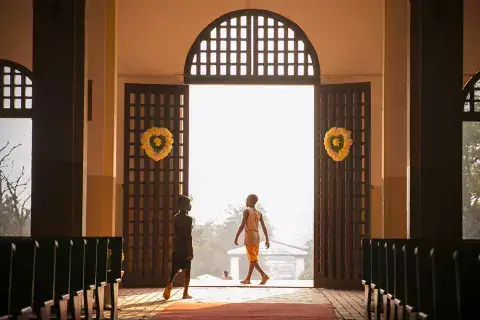
Two boys pass through the main doors the Cathédrale Notre-Dame of Bangui. Photo: Kaleb Warnock/KAICIID
CAR is predominantly Christian, while 96 per cent of the country’s population identifies with at least one of the three major faiths (Protestantism, Catholicism and Islam).
KAICIID engages the Christians of CAR by supporting the Bangui interfaith platform that is made up of religious leaders from each of the major congregations: the Archbishop, an imam and a pastor who are active in countering hate speech and incitement to violence. Through the interfaith platform, KAICIID is working to bring the Christians and the Muslims together, and this platform will serve as a model for supporting interreligious platforms across the country.
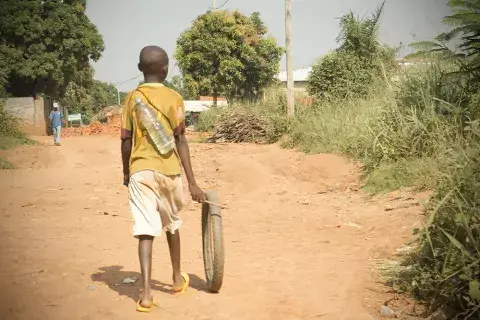
A child rolls a discarded tire in the late morning sun. Photo: Kaleb Warnock/KAICIID
Children all over the Central African Republic are unable to attend school due to violence, but as the conflict has cooled in some areas, they have begun to return to the classroom.
KAICIID’s training also includes those who are most vulnerable, yet, are key actors, such as women and youth. Building community cohesion from the ground up is key to preventing radicalisation and overcoming destructive mind-sets to cultivate a peaceful future for Bangui’s young people.
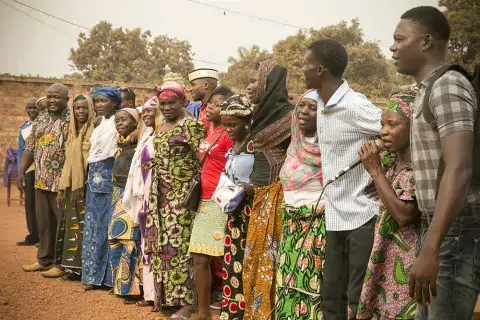
Christians and Muslims of Bangui participate in a peace march. Photo: Kaleb Warnock/KAICIID
This march was one of several trust-building activities sponsored by KAICIID. A key part of KAICIID’s activities in CAR is to bring together Christians and Muslims at the grassroots level to improve community relations through mutual understanding and respect.
Other activities included participative theatre performances, football matches of Christian and Muslim mixed teams, religious song concerts and cultural exchange events.
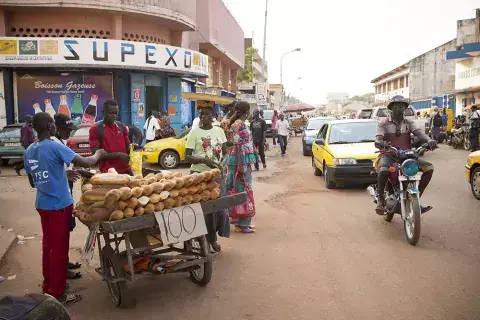
A man sells baguettes from a rickshaw – a common sight in the Bangui city centre. Photo: Kaleb Warnock/KAICIID
Security is slowly returning to the city due to the United Nations Multidimensional Integrated Stabilization Mission in the Central African Republic (MINUSCA), a force of more than 12,000 peacekeepers. However, outside of the capital armed groups control 14 out of 16 prefectures in the country and violence persists. KAICIID is training community leaders from all over the country in dialogue who will incorporate dialogue into their own community structures throughout the country.
KAICIID will continue to promote dialogue through engaging the people of CAR at every level: from the grassroots to community leaders to policymakers who are risking their lives to bring peace to their troubled country. Our role is to promote these voices and these messages, and provide them not just a space to dialogue, but the means to achieve peace.